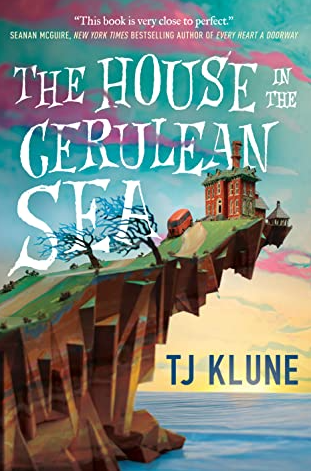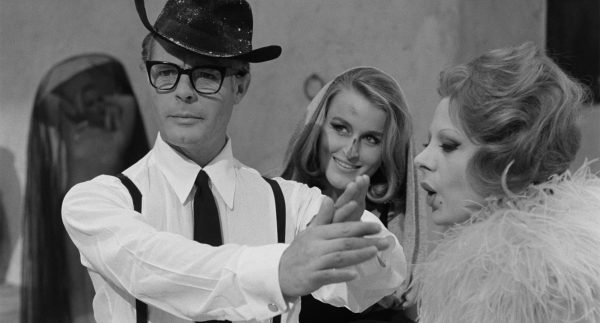Escape to “The House in the Cerulean Sea”

While sad and depressing books are often incredible works of literature, it’s important to keep a balance between them and books that just make you happy. One great candidate for such a break is The House in the Cerulean Sea by T.J. Klune, which follows an introverted, workaholic older man who is assigned to examine the conditions at an orphanage for magical youth. He has done this before – it is his job, after all, and he considers himself to be quite good at it – but this orphanage is different. Its inhabitants seem shocking and dangerous, and include the antichrist and a green blob of unknown origin among other odd creatures. Though petrified at first, Linus Baker eventually comes to see that the magical children are not as harmful as they might seem as he slowly puts his prejudices aside.
The House in the Cerulean Sea is a wholesome and relaxing read perfect for anyone looking for an escape. According to #1 New York Times bestselling author V.E. Schwab, “It is like being wrapped up in a big gay blanket. Simply perfect.” This feeling is achieved through a light, sarcastic tone established by lovable characters, the perfect balance of magic and realism, and the underlying theme that there is hope yet for a hateful society to improve.
The tone of a novel is arguably one of the most influential aspects in driving the feeling that it gives the reader. In The House in the Cerulean Sea, the dialogue between the characters is often comical and humorous. Linus Baker, the main character, is often surprised and panicked by his interactions with others in the novel, especially the magical children, but attempts to remain polite, saying phrases such as “oh my!” and “pardon”, which contribute to the novel’s wholesome and comical tone. When he is angered by the characters to the point where he is no longer able to be polite, his attempts to yell at them do not affect them at all, which paints him as a frazzled man who the reader can’t help but sympathize with and love rather than feeling stress-inducing tension within the scene. Additionally, the magical children that he encounters soon reveal through their dialogue that they are not as threatening as their appearance might reveal. For example, after the antichrist, who is a six-year-old boy, threatens Linus and tells him all of the evil things that he will do to him, he then grins and is criticized by the others for being too theatrical, causing his threats to seem like more of those of a playful child rather than the antichrist.
Another part of the novel that makes the reader feel a sense of comfort and joy is the ability for the characters to grow unlikely friendships with each other. For example, when the green blob, called Chauncey, enthusiastically tells Linus that he would like to be a bellhop, the rest of the creatures agree that he is going to be the best one there is. This display of innocent dreams and support of one another reflects the behavior of kind, human children. The notion that everyone should look past prejudices, as reflected by this characterization of the children once Linus gets to know them, is one that is frequently repeated in the book, especially by resonant quotes by the owner of the orphanage, Mr. Parnassus, who frequently reminds Linus Baker to keep an open mind about the children and not judge them too quickly. The novel seeks to remind readers that there is good in the world if you allow yourself to remove your prejudices and see it, which is evident as the children who Linus originally thought were dangerous and evil help him to overcome his own insecurities, such as his physical appearance.
T.J. Klune has also executed a perfect balance of magic and realism in this novel, which helps it to be an escape from reality for the reader but also a story that will give them valuable applications into their own lives as well. The main character, Linus Baker, is one who many readers will relate to – he is obsessed with performing perfectly at his job, stressed about his coworkers’ opinions of him, and demoralized by nosy and obnoxious neighbors. The descriptions and titles of the aspects of his work life are often comically exaggerated – such as his superiors being called Extremely Upper Management – which makes them even more relatable for a reader who is fed up with their job. He yearns to escape the monotony and stress of his work life by traveling away to the ocean on the postcard he keeps at his desk, and his assignment to the “house on the cerulean sea” allows him to do just that. The reader is taken on the same journey with him, and they are equally presented with the blissful happiness of the island as well as Linus’ stress about his job and the existence of prejudice and hate which they are working to overcome. This makes the story feel realistic enough to be appealing and relatable while also having a fantastical component that gives the reader a sense of escape – just as it does for Linus.
In conclusion, if you’re looking for an escape from the stress of your daily life, the wholesome and funny novel The House in the Cerulean Sea might be the perfect literary destination for you!

Dakotah is a senior and a Journalism II student this year. She is very excited to be returning to The Paw for her first year as an Editor-in-Chief. Outside...






































